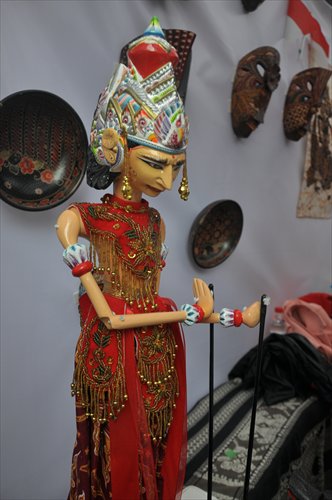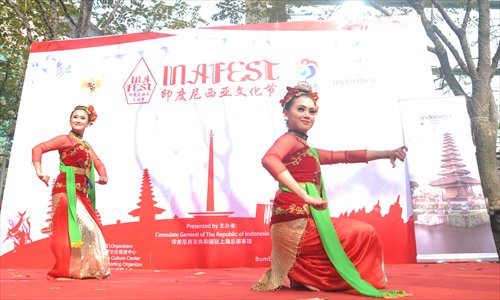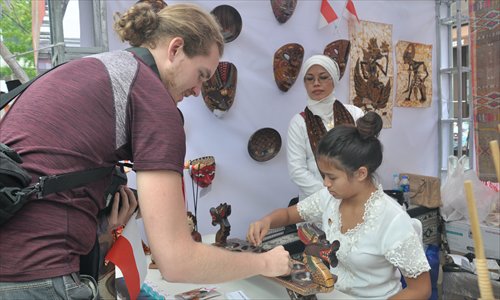HOME >> LIFE, METRO SHANGHAI
Experiencing Indonesia
By Huang Lanlan Source:Global Times Published: 2015-11-30 19:03:01
Two female performers with red flowers on their heads are dancing exotically onstage accompanied by Southeast Asian-style music. Wearing gorgeous red-and-gold dresses along with green scarves, the dancers wave a blue folding fan in their hands while twirling around in graceful steps.
Next to the stage, a food stall giving away free handmade snacks and drinks has patrons lining up. The aroma of fried rice and spice-infused beverages fills Jing'an Park for two tantalizing days of INAFEST 2015, drawing thousands of visitors for a taste of Indonesia.
The festival was the first large-scale tourism event that the Indonesia Consulate General in Shanghai has held since it was established in 2012. "We invited professional Indonesian dancers and singers to give performances with original Indonesian characteristics," said Kenssy D. Ekaningsih, the Consul General of Indonesia in Shanghai. "The snacks and beverages that we offered were made by experienced cooks from my home country."
Exquisite rarities
One of the cooks is Fiky Nugrahawan Affandi, who runs a restaurant in Indonesia. At the invitation of the consulate, Fiky came to China especially for the festival. Among his specialties are Tempe (or Tempeh), a traditional Indonesian snack made of soybeans, Sate Lilit, a popular Balinese minced chicken (or fish or beef) wound around bamboo sticks and grilled on charcoal, and Rendang fried rice, a combination of spicy beef and rice. "These are typical Indonesian food and are liked by lots of people in and out of the country," Fiky told the Global Times.
The chef also used the opportunity to introduce one of his own inventions, a hot, dark-brown beverage made of several spices including ginger and vanilla. "It has a sweet and spicy flavor," he said, explaining that spices can keep the body warm in the winter. "The weather in Shanghai is very cold now, so I hope those who drink this will feel warmer."
Another popular stall at the festival was a handicraft exhibition featuring colorful handmade fabrics, masks and delicate ornaments. The stall was staffed by members of the Indonesia Women Association, which includes the spouses of consulate officers in Shanghai.
"We brought these items from our home country," said Indah Purnamawati while displaying two pieces of fabric from North Sumatra and the island of Lombok. Although these handmade fabrics can be worn as scarves or clothing, many Indonesian women choose to carefully preserve them in boxes. "Exquisite handmade fabrics like these are very rare now," she said.
According to Purnamawati, before an Indonesian woman gets married, her parents will send her expensive fabric as a betrothal gift. As it will be passed down through the generations, the fabric gradually becomes a family heirloom. "If someday you lost it, your parents would be very angry with you."
Besides the fabrics, visitors also took an interest in some oddly shaped wooden boats with two dragon heads fore and aft. These are Congklak, a popular children's game in Indonesia. "Look, there are 12 holes on the playing board," said association member Rina Hanifa while demonstrating to the Global Times how to play the game by placing small shells into each hole.
Rina recalled that when she was young, she often played Congklak with her friends. "It was very popular among Indonesian children 30 years ago," she said. Unfortunately, the game is much less welcomed today than then, with only children from rural villages still playing it. "Most kids are busy with their iPad or other electronic products," she sighed.
At an excellent stage
Following the performance, visitors queued up to pose for photos with two young Indonesian women, who were dressed to look like fairies from ancient Indonesian myths. One of the women, Carolina from Jakarta, has been studying at Shanghai International Studies University for two years.
The 20-year-old speaks fluent Chinese, telling the Global Times in Putonghua that the costume she wore is called Baju Bodo, a traditional outfit in Makassar, Sulawesi Island's largest city. "Every local girl there has a Baju Bodo," she said. "We wear it on special occasions such as birthday parties, graduation and wedding ceremonies."
Sino-Indonesia relations have greatly improved after the two countries officially reestablished diplomatic relations in 1990. "The relationship between us is at an excellent stage," said Consul General Kenssy, who said that due to the festival's success in Shanghai she is considering turning it into an annual event.
Indonesia has recently been making a greater effort to explore the Chinese tourism market. Kenssy said that she hopes Shanghainese people will know more about her home country through this festival, which she hopes will compel them to travel there. "Knowing Indonesia more and more, I think they will be falling in love with the country, and may visit it someday."




Next to the stage, a food stall giving away free handmade snacks and drinks has patrons lining up. The aroma of fried rice and spice-infused beverages fills Jing'an Park for two tantalizing days of INAFEST 2015, drawing thousands of visitors for a taste of Indonesia.
The festival was the first large-scale tourism event that the Indonesia Consulate General in Shanghai has held since it was established in 2012. "We invited professional Indonesian dancers and singers to give performances with original Indonesian characteristics," said Kenssy D. Ekaningsih, the Consul General of Indonesia in Shanghai. "The snacks and beverages that we offered were made by experienced cooks from my home country."
Exquisite rarities
One of the cooks is Fiky Nugrahawan Affandi, who runs a restaurant in Indonesia. At the invitation of the consulate, Fiky came to China especially for the festival. Among his specialties are Tempe (or Tempeh), a traditional Indonesian snack made of soybeans, Sate Lilit, a popular Balinese minced chicken (or fish or beef) wound around bamboo sticks and grilled on charcoal, and Rendang fried rice, a combination of spicy beef and rice. "These are typical Indonesian food and are liked by lots of people in and out of the country," Fiky told the Global Times.
The chef also used the opportunity to introduce one of his own inventions, a hot, dark-brown beverage made of several spices including ginger and vanilla. "It has a sweet and spicy flavor," he said, explaining that spices can keep the body warm in the winter. "The weather in Shanghai is very cold now, so I hope those who drink this will feel warmer."
Another popular stall at the festival was a handicraft exhibition featuring colorful handmade fabrics, masks and delicate ornaments. The stall was staffed by members of the Indonesia Women Association, which includes the spouses of consulate officers in Shanghai.
"We brought these items from our home country," said Indah Purnamawati while displaying two pieces of fabric from North Sumatra and the island of Lombok. Although these handmade fabrics can be worn as scarves or clothing, many Indonesian women choose to carefully preserve them in boxes. "Exquisite handmade fabrics like these are very rare now," she said.
According to Purnamawati, before an Indonesian woman gets married, her parents will send her expensive fabric as a betrothal gift. As it will be passed down through the generations, the fabric gradually becomes a family heirloom. "If someday you lost it, your parents would be very angry with you."
Besides the fabrics, visitors also took an interest in some oddly shaped wooden boats with two dragon heads fore and aft. These are Congklak, a popular children's game in Indonesia. "Look, there are 12 holes on the playing board," said association member Rina Hanifa while demonstrating to the Global Times how to play the game by placing small shells into each hole.
Rina recalled that when she was young, she often played Congklak with her friends. "It was very popular among Indonesian children 30 years ago," she said. Unfortunately, the game is much less welcomed today than then, with only children from rural villages still playing it. "Most kids are busy with their iPad or other electronic products," she sighed.
At an excellent stage
Following the performance, visitors queued up to pose for photos with two young Indonesian women, who were dressed to look like fairies from ancient Indonesian myths. One of the women, Carolina from Jakarta, has been studying at Shanghai International Studies University for two years.
The 20-year-old speaks fluent Chinese, telling the Global Times in Putonghua that the costume she wore is called Baju Bodo, a traditional outfit in Makassar, Sulawesi Island's largest city. "Every local girl there has a Baju Bodo," she said. "We wear it on special occasions such as birthday parties, graduation and wedding ceremonies."
Sino-Indonesia relations have greatly improved after the two countries officially reestablished diplomatic relations in 1990. "The relationship between us is at an excellent stage," said Consul General Kenssy, who said that due to the festival's success in Shanghai she is considering turning it into an annual event.
Indonesia has recently been making a greater effort to explore the Chinese tourism market. Kenssy said that she hopes Shanghainese people will know more about her home country through this festival, which she hopes will compel them to travel there. "Knowing Indonesia more and more, I think they will be falling in love with the country, and may visit it someday."

An Indonesian handicraft doll, which is a traditional wedding present.

Indonesian women give a dance performance.

A foreigner tries to play Congklak, a popular children's game in Indonesia.

Carolina (right) with her friend in traditional costume Baju Bodo.
Photos: Huang Lanlan/GT
Posted in: Events, Metro Shanghai